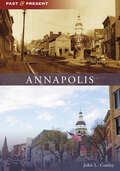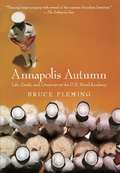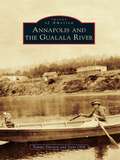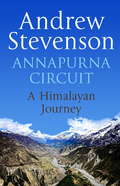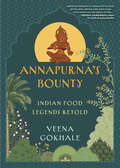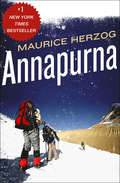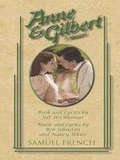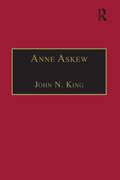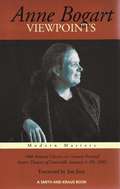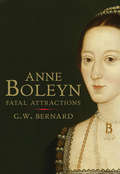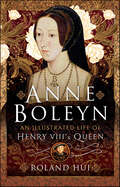- Table View
- List View
Annapolis (Past and Present)
by John L. ConleyHome to the United States Naval Academy since 1845, Annapolis and its busy harbor attract visitors from around the world. Since its founding in the 1600s, Annapolis has played an important role in American history. The area became Maryland's capital in 1694, and its capitol building is the longest in continuous use in the United States. John L. Conley is an Annapolis area writer. The historic images in this book are from his personal collection.
Annapolis Autumn
by Bruce FlemingWhat really goes on behind the wall that surrounds the United States Naval Academy in Annapolis? What are all those midshipmen, future officers in the U.S. Naval and Marine Corps and leaders of our society, thinking as they stand in neat ranks at the parades beloved by tourists? What are their professors actually educating them to do.In Annapolis Autumn, Bruce Fleming, professor of English for nearly two decades at the academy and a prizewinning author, captures the sights, sounds, colors, and conversations of this tradition-steeped institution.In other classes, the cadets learn how to assemble guns, control armored vehicles, man battleships, and kill other human beings. Nothing is ever less than "outstanding, sir!" In English class, however, Fleming introduces his students to nuance and subtext, to the gay poets of World War I, and to the idea that not every piece of literature is designed to be "motivational." Sharing stories from his twenty years at the academy, Fleming explores questions about teaching, the labels "liberal" and "conservative," and the ultimate purpose of higher education-issues made all the more gripping at a time when many of his students will graduate from the classroom to the battlefield.
Annapolis and the Gualala River (Images of America)
by Tammy Durston Steve OliffAnnapolis--a hidden jewel of a community--is tucked into the timber-filled ridges above the jagged northern Sonoma coastline. Undeterred by the steep, mountainous terrain and rugged living, early settlers were first lured to the area by the timber. They quickly discovered Annapolis had perfect weather for apple farming. At the beginning of the 20th century, almost every farm had apples, and apple dryers dotted the hills. The wild Gualala River, known for Coho salmon and steelhead trout, is 32 miles long and flows through the Annapolis area before meeting the Pacific Ocean. Early Native American Pomo tribes settled along this important river, which eventually served as a boundary between Sonoma and Mendocino Counties.
Annapolis: A Novel
by William MartinFrom the days of pirate raids on the Chesapeake to swift-boat actions in Vietnam, the Staffords and their traditional rivals, the Parrishes, struggle with foreign enemies and each other to build a navy and a nation. They march across the deserts of Tripoli, sail into the South Seas to battle the British and dally with the native girls, fight aboard the Merrimac and the Monitor, fly into the battle of Midway, and look into the living faces of all four men on Mount Rushmore. When Stafford descendant Susan Browne sets out to film a documentary about her famous ancestry, her work sweeps her into the past, to celebrate Stafford victories, mourn their losses, and confront their secrets. Annapolis is William Martin's most ambitious novel, a tale of romance and courage, honor and patriotism, an ode to the men and women who have made the proud traditions of the United States Navy.At the Publisher's request, this title is being sold without Digital Rights Management Software (DRM) applied.
Annapurna
by Meg SerinoDuring a treacherous winter trek to the basecamp of Annapurna, one woman is forced to confront the events leading up to her best friend&’s tragic death twenty years earlier as well as the nature of their friendship, the meaning of love, and the unexpected consequences of what is spoken—and what is not.&“Meg Serino artfully layers past and present to explore how our unruly desires and betrayals can be as fatal as nature. Both an adventure story and an addictive exploration of more human mysteries.&” —Michelle Wildgen, Author of Wine People When Livy receives a package containing the ashes of her best friend, she knows she must return to the place Mo loved best to honor her memory. Leaving her son and her estranged husband behind, Livy travels to Kathmandu and the mountain towns of Nepal, and to the past, along with the three other original members of the trek. As they navigate the trail during harsh winter conditions, Livy is forced to confront painful memories and the revelation of long-buried secrets, putting her life—and her whole concept of self—on the line. She must finally face the mystery that&’s haunted her all these years: the circumstances surrounding her best friend&’s death. Following Livy as she struggles to find a path to safety and self-knowledge through dangerously high altitudes and deadly avalanches, frostbite, and injuries, Annapurna explores the meaning of love, the nature of memories, and the often-entangled roles of a parent, spouse, lover, and friend. Annapurna is a novel for anyone who has ever ventured from home hoping to find answers or to make peace with the past. Ultimately, it is a story about how far we sometimes need to go in order to discover where we belong.
Annapurna Circuit: Himalayan Journey
by Andrew StevensonMany disenchanted Westerners have gone to the Himalayas in search of renewal, but no one has written about the experience as perceptively and personally as Andrew Stevenson in Annapurna Circuit. A traveller all his life, Stevenson responds to people and places with an openness unique to the cultural nomad - his portraits of the men, women and children of the Annapurnas, and the fellow-backpackers from all over the world who intermittently shared his journey, are a delight; his descriptions of the landscape, and the physical hardships of the trek are enthralling. But like every travel book of real quality, this is also the result of a spiritual journey. A richly rewarding read on every level, Annapurna Circuit is a modern travel classic in the tradition of Peter Matthiesson's Snow Leopard and Andrew Harvey's Journey to Ladakh.
Annapurna Circuit: Himalayan Journey
by Andrew StevensonMany disenchanted Westerners have gone to the Himalayas in search of renewal, but no one has written about the experience as perceptively and personally as Andrew Stevenson in Annapurna Circuit.A traveller all his life, Stevenson responds to people and places with an openness unique to the cultural nomad - his portraits of the men, women and children of the Annapurnas, and the fellow-backpackers from all over the world who intermittently shared his journey, are a delight; his descriptions of the landscape, and the physical hardships of the trek are enthralling. But like every travel book of real quality, this is also the result of a spiritual journey. A richly rewarding read on every level, Annapurna Circuit is a modern travel classic in the tradition of Peter Matthiesson's Snow Leopard and Andrew Harvey's Journey to Ladakh.
Annapurna's Bounty: Indian Food Legends Retold
by Veena GokhaleMingling sweet, sour, and spicy notes, this inspiring retelling of diverse food legends from India, paired with delicious recipes, will feed mind, body, heart, and soul.Annapurna, the Indian Goddess of Nourishment, presides over a rich harvest of stories reimagined for the twenty-first-century palate. Here, food manifests as ploy, bargain, symbolic communication, a bone of contention, a lesson, as it weaves through the lives of a cast of characters — kings and commoners, witches and goddesses, gurus and bandits, refugees and travellers.Each story is followed by a vegetarian recipe offered up by a character. Gathered from the four corners of India, there are well-known dishes like nourishing dal and irresistible mango lassi, novelties like avial and Bengali khichari, as well as a new twist on beloved foods, such as samosas with a peas and coconut filling.Infused with humane values, expertly blending the timeless and the contemporary, the magical and the everyday, encompassing East, West, and the in-between, this fusion of fiction and food will delight and inspire.
Annapurna: The First Conquest of an 8,000-Meter Peak (Lyons Press Ser.)
by Maurice HerzogOne of Sports Illustrated&’s Top 100 Sports Books of All Time: A gripping firsthand account of one of the most daring climbing expeditions in history. #1 New York Times Bestseller Annapurna I is the name given to the 8,100-meter mountain that ranks among the most forbidding in the Himalayan chain. Dangerous not just for its extreme height but for a long and treacherous approach, its summit proved unreachable until 1950, when a group of French mountaineers made a mad dash for its peak. They became the first men to accomplish the feat, doing so without oxygen tanks or any of the modern equipment that contemporary climbers use. The adventure nearly cost them their lives. Maurice Herzog dictated this firsthand account of the remarkable trek from a hospital bed as he recovered from injuries sustained during the climb. An instant bestseller, it remains one of the most famous mountaineering books of all time, and an enduring testament to the power of the human spirit.
Anna’s Game Plan: Conquer your hang ups, unlock your confidence and find your purpose
by Anna Geary'An incredible life-changing guide to achieving true happiness and success' Kathryn ThomasAs an All-Ireland winning camogie player, Anna Geary learned that the right mindset unlocks everything. It builds confidence, brings success and provides perspective when things don’t go to plan.Sharing the power of mindset has been at the heart of her post-playing career as a speaker, trainer, health and well-being coach and even as a broadcaster.Because daily life is so full-on our mindsets can get disrupted and make us stress about the wrong things. In Anna’s Game Plan, Anna shares the powerful ways that managing your mindset can be life-changing.Based on her extensive experience in nurturing healthy attitudes to mind and body, Anna lays out five practical tactics – Acceptance, Purpose, Consistency, Challenge, Kindness – that can equip you with a practical toolkit to banish overwhelm and focus on what’s really important.Packed with honest relatable stories from Anna’s own life, as well as fascinating insights from the behavioural sciences, Anna’s Game Plan is an essential one-stop guide to building confidence and creating the life you deserve. Change your mindset. Change your life!'Anna's Game Plan will help you to be the best version of you' Karl Henry
Anne & Gilbert
by Nancy White Jeff Hochhauser Bob JohnstonMusic by Bob Johnston and Nancy White Book by Jeff Hochhauser Lyrics by Nancy White, Bob Johnston and Jeff Hochhauser Based on the novels Anne of Avonlea and Anne of the Island by L.M. Montgomery Based on the sequel novels to Anne of Green Gables, this new Canadian musical continues the story of Anne Shirley's life. Set in the village of Avonlea and at Redmond College in Halifax, Anne and Gilbert follows Anne's journey to young adulthood and her romance with high school academic rival, Gilbert Blythe. Gilbert is in love with Anne, but she seems to be immune to his declarations of love. In the end, Anne realizes what everyone else already knows: that Gilbert is the love of her life. "Anne and Gilbert is a marvel." - The Toronto Star "When the curtain fell, I was disappointed to see it all end." - Variety "It is funny, charming, and musically and visually sensational. Writers, Jeff Hochauser, Nancy White, and Bob Johnstone...have succeeded in grand fashion. Refreshingly modern, Anne & Gilbert is magically artistic, and oh so romantic!" - The Buzz "Heartwarming, tear-inducing, thoroughly satisfying" - The Halifax Chronicle Herald
Anne & Henry
by Dawn IusIn this wonderfully creative retelling of the infamous--and torrid--love affair between Anne Boleyn and King Henry VIII, history collides with the present when a sizzling romance ignites in a modern-day high school.Henry Tudor's life has been mapped out since the day he was born: student body president, valedictorian, Harvard Law School, and a stunning political career just like his father's. But ever since the death of his brother, the pressure for Henry to be perfect has doubled. And now he's trapped: forbidden from pursuing a life as an artist or dating any girl who isn't Tudor-approved. Then Anne Boleyn crashes into his life. Wild, brash, and outspoken, Anne is everything Henry isn't allowed to be--or want. But soon Anne is all he can think about. His mother, his friends, and even his girlfriend warn him away, but his desire for Anne consumes him. Henry is willing to do anything to be with her, but once they're together, will their romance destroy them both? Inspired by the true story of Anne Boleyn and King Henry VIII, Anne & Henry beautifully reimagines the intensity, love, and betrayal between one of the most infamous couples of all time.
Anne Arrives: Inspired by Anne of Green Gables (An Anne Chapter Book #1)
by Kallie GeorgeThe charming first book in a new early-reader series, starring the spirited -- and outspoken -- Anne Shirley as she first arrives at Green Gables.Marilla and Matthew Cuthbert need help on their farm, so they've adopted what they hope will be a sturdy, helpful boy. Instead, Matthew finds Anne awaiting him at the train station -- imaginative, brash, redheaded Anne-with-an-e. With her place at the Cuthberts' at risk -- particularly if nosy neighbor Mrs. Lynde has anything to say about it -- Anne will have to learn patience, understanding and what it takes to make Green Gables her true home.Lovingly adapted by Kallie George with beautiful, nostalgic illustrations by Abigail Halpin, Anne Arrives is perfect for new fans of Anne and old.
Anne Arrives: Inspired by Anne of Green Gables (An Anne Chapter Book)
by Kallie GeorgeThe charming first book in a new early-reader series, starring the spirited -- and outspoken -- Anne Shirley as she first arrives at Green Gables.Marilla and Matthew Cuthbert need help on their farm, so they've adopted what they hope will be a sturdy, helpful boy. Instead, Matthew finds Anne awaiting him at the train station -- imaginative, brash, redheaded Anne-with-an-e. With her place at the Cuthberts' at risk -- particularly if nosy neighbor Mrs. Lynde has anything to say about it -- Anne will have to learn patience, understanding and what it takes to make Green Gables her true home.Lovingly adapted by Kallie George with beautiful, nostalgic illustrations by Abigail Halpin, Anne Arrives is perfect for new fans of Anne and old.
Anne Askew: Printed Writings 1500–1640: Series 1, Part One, Volume 1 (The Early Modern Englishwoman: A Facsimile Library of Essential Works & Printed Writings, 1500-1640: Series I, Part One #Vol. 1)
by John N. KingAnne Askew (1521-1546) was accused of heresy because of her denial of the Catholic doctrine of transubstantiation and ritual of mass. These two works provide an extremely rare autobiographical account of heresy interrogations, torture, trial and conviction. Her manuscripts were smuggled out of England to John Bale on the Continent who edited and published them in 1545 and 1546 respectively.
Anne Belinda: A Golden Age Mystery
by Patricia WentworthA WWI veteran searches for a woman he once knew—and stumbles into a mystery—in a novel by the author of the Miss Silver series. In 1917, after he&’s released from the hospital, John Waveney is headed back to the trenches in France when he decides to visit the land of his ancestors dating back to the Crusades. There, he meets a young girl who, upon learning he&’s all alone in the world, tells him she&’d be sorry if anything happened to him at the front. Nine years later, John returns to Waveney Hall to claim his legacy—and encounters an extended family of relatives he never knew about. But Anne Belinda, a distant cousin—the mysterious young girl he never forgot—has disappeared. No one at his ancestral estate will discuss her or explain why her father altered his will, leaving his entire estate to her twin sister, Jenny. Feeling a debt of loyalty to the girl who sent him off to battle with a kind word, John embarks on a search for Anne—but does the missing woman want to be found? This 1928 novel from one of Britain&’s most beloved crime authors tells a shocking story of crime and sacrifice that can destroy lives—or redeem them.
Anne Bogart: Viewpoints
by Joel A. Smith Michael Bigelow DixonModern masters; Career development series. Bogart, Anne, -- 1951- -- Criticism and interpretation.
Anne Boleyn
by G. W. BernardIn this groundbreaking new biography, G. W. Bernard offers a fresh portrait of one of England's most captivating queens. Through a wide-ranging forensic examination of sixteenth-century sources, Bernard reconsiders Boleyn's girlhood, her experience at the French court, the nature of her relationship with Henry, and the authenticity of her evangelical sympathies. He depicts Anne Boleyn as a captivating, intelligent, and highly sexual woman whose attractions Henry resisted for years until marriage could ensure legitimacy for their offspring. He shows that it was Henry, not Anne, who developed the ideas that led to the break with Rome. And, most radically, he argues that the allegations of adultery that led to Anne's execution in the Tower could be close to the truth.
Anne Boleyn
by Marie Louise BruceHenry VIII;s campaign to win over Anne Boleyn at last succeeded, but her reign was short, and her fall was stunning, swift and cruel.
Anne Boleyn & Elizabeth I: The Mother and Daughter Who Changed History
by Tracy BormanOne of the most extraordinary mother and daughter stories of all time - Anne Boleyn, the most famous of Henry VIII's wives and her daughter Elizabeth, the 'Virgin Queen'.Anne Boleyn is a subject of enduring fascination. By far the most famous of Henry VIII's six wives, she has inspired books, documentaries and films, and is the subject of intense debate even today, almost 500 years after her violent death. For the most part, she is considered in the context of her relationship with Tudor England's much-married monarch. Dramatic though this story is, of even greater interest - and significance - is the relationship between Anne and her daughter, the future Elizabeth I.Elizabeth was less than three years old when her mother was executed. Given that she could have held precious few memories of Anne, it is often assumed that her mother exerted little influence over her.Nothing could be further from the truth. Elizabeth knew that she had to be discreet about Anne, but there is compelling evidence that her mother had a profound impact on her character, beliefs and reign. Anne's radical religious views shaped those of her daughter, and as a woman who wielded power over a male-dominated court, she provided an inspiring role model for Elizabeth's queenship. Even during Henry's lifetime, Elizabeth dared to express her sympathy for her late mother by secretly wearing Anne's famous 'A' pendant when she sat for a painting with her father and siblings.Piecing together evidence from original documents and artefacts, this book tells the fascinating, often surprising story of Anne Boleyn's relationship with, and influence over her daughter Elizabeth. In so doing, it sheds new light on two of the most famous women in history and how they changed England forever.(P) 2023 Hodder & Stoughton Limited
Anne Boleyn & Elizabeth I: The Mother and Daughter Who Changed History
by Tracy Borman'(A)sensational book by one of our greatest and best-loved historians... Astoundingly good.' - Alison Weir 'Masterful, captivating, page-turning, this is solid gold history at its best.' - Nicola Tallis'(A) thought-provoking, impeccably researched, and moving account uncovering how Anne's family, intellect, and tragedy shaped Elizabeth I's extraordinary career.' - Gareth Russell'Her extensive research... reveals them as the most dazzling female double act in history.' - Sarah Gristwood'Incredibly well-researched, elegantly written, and overall genuinely ground-breaking,' - Estelle ParanqueOne of the most extraordinary mother and daughter stories of all time - Anne Boleyn, the most famous of Henry VIII's wives and her daughter Elizabeth, the 'Virgin Queen'.Anne Boleyn is a subject of enduring fascination. By far the most famous of Henry VIII's six wives, she has inspired books, documentaries and films, and is the subject of intense debate even today, almost 500 years after her violent death. For the most part, she is considered in the context of her relationship with Tudor England's much-married monarch. Dramatic though this story is, of even greater interest - and significance - is the relationship between Anne and her daughter, the future Elizabeth I.Elizabeth was less than three years old when her mother was executed. Given that she could have held precious few memories of Anne, it is often assumed that her mother exerted little influence over her. But this is both inaccurate and misleading. Elizabeth knew that she had to be discreet about Anne, but there is compelling evidence that her mother exerted a profound influence on her character, beliefs and reign. Even during Henry's lifetime, Elizabeth dared to express her sympathy for her late mother by secretly wearing Anne's famous 'A' pendant when she sat for a painting with her father and siblings.Piecing together evidence from original documents and artefacts, this book tells the story of Anne Boleyn's relationship with, and influence over her daughter Elizabeth. In so doing, it sheds new light on two of the most famous and influential women in history.
Anne Boleyn in London
by Lissa ChapmanA portrait of the doomed queen&’s image and influence that provides &“a detailed look at real life in Tudor England&” (Manhattan Book Review). Romantic victim? Ruthless other woman? Innocent pawn? Religious reformer? Fool, flirt, and adulteress? Politician? Witch? During her life, Anne Boleyn, Henry VIII&’s ill-fated second queen, was internationally famous—or notorious. Today, she still attracts passionate adherents and furious detractors. It was in London that most of the drama of Anne Boleyn&’s life and death was played out, most famously in the Tower of London, the scene of her coronation celebrations, her trial, and her execution, and the place where her body lies buried. In her few years as a public figure, Anne Boleyn was influential as a patron of the arts and of French taste, as the center of a religious and intellectual circle, and for her purchasing power, both directly and as a leader of fashion. It was primarily to London, beyond the immediate circle of the court, that her carefully spun image as queen was directed during the public celebrations surrounding her coronation. In the centuries since Anne Boleyn&’s death, her reputation has expanded to give her an almost mythical status in London, inspiring everything from pub names to music hall songs and novels—not to mention merchandise including pincushions with removable heads. Over fifty Twitter accounts use some version of her name. This book looks at both the effect London and its people had on the course of Anne Boleyn&’s life and death—and the effects she had, and continues to have, on them.
Anne Boleyn, A King's Obsession: A Novel (Six Tudor Queens)
by Alison WeirIn this second novel of Alison Weir’s epic Six Tudor Queens series, the acclaimed author and historian weaves exciting new research into the story of Anne Boleyn, Henry VIII’s most infamous wife, a woman ahead of her time whose very life—and death—forever changed a nation. Born into a noble English family, Anne is barely a teenager when she is sent from her family’s Hever Castle to serve at the royal court of the Netherlands. Yet what seems a strategic move on the part of her opportunistic father is actually a chance for the girl to grow and discover herself. There, and later in France, Anne thrives, preferring to absorb the works of progressive writers rather than participate in courtly flirtations. She also begins to understand the inequalities and indignities suffered by her gender. Anne isn’t completely inured to the longings of the heart, but her powerful family has ambitious plans for her future that override any wishes of her own. When the King of England himself, Henry VIII, asks Anne to be his mistress, she spurns his advances—reminding him that he is a married man who has already conducted an affair with her sister, Mary. Anne’s rejection only intensifies Henry’s pursuit, but in the absence of a male heir—and given an aging Queen Katherine—the opportunity to elevate and protect the Boleyn family, and to exact vengeance on her envious detractors, is too tempting for Anne to resist, even as it proves to be her undoing. While history tells of how Anne Boleyn died, this compelling new novel shows just how she lived. Praise for Katherine of Aragon, the True Queen “Alison Weir starts off her six-volume fictional series about the wives of King Henry VIII with a nuanced portrayal of Katherine of Aragon.”—The Christian Science Monitor “In this first novel of the Six Tudor Queens series, Alison Weir dazzlingly brings Katherine of Aragon to life. She emerges as a charismatic, indomitable, and courageous heroine whose story never fails to enthrall.”—Tracy Borman, author of Thomas Cromwell “As always, Weir demonstrates a keen eye for crafting dramatic scenes of beautiful, accurate detail, instilling in the reader a vivid sense of being there. . . . If this greatly impressive inaugural installment is any indication, Tudor lovers have much to look forward to.”—Booklist (starred review) “An illuminating and engaging portrait of ‘the true queen.’”—Historical Novels Review
Anne Boleyn, An Illustrated Life of Henry VIII's Queen
by Roland HuiIf you remember my love in your prayers as strongly as I adore you, I shall hardly be forgotten, for I am yours,' - Henry Rex, forever Written by King Henry VIII to his sweetheart, the seductive and vivacious Anne Boleyn, his passion for her would be so great that Henry would make Anne his queen, and change the course of English history. But the woman whom Henry had promised to love for all time would go from palace to prison, charged with heinous crimes. Her life ended on a bloody scaffold in the Tower of London. Explore the incredible story of Anne Boleyn, the most famous and controversial of Henry VIII's six wives, in this exciting new account of her life told in words and pictures.
